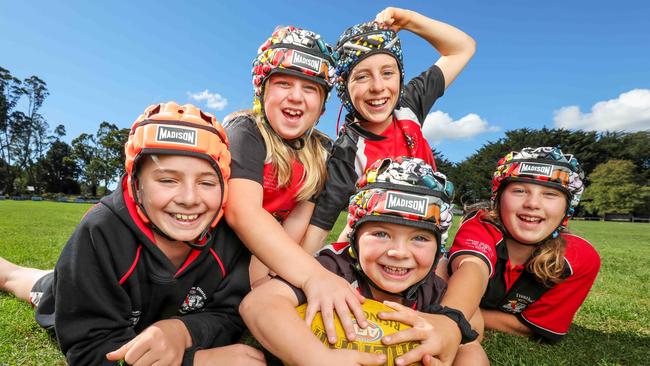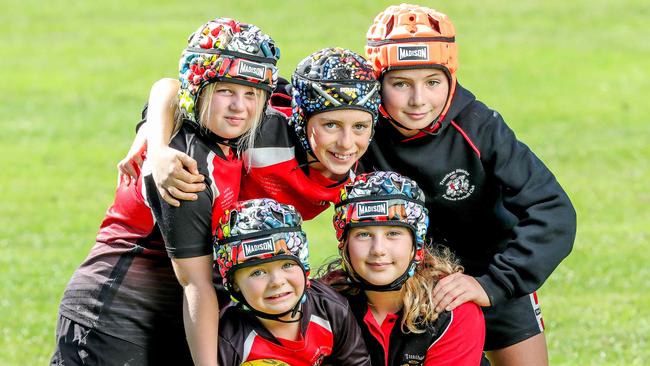Trentham aim to stop head injuries by forcing juniors to wear helmets
A country footy club will force all junior players under the age of 14 to wear helmets in games this season. Here’s why.
Country Footy
Don't miss out on the headlines from Country Footy. Followed categories will be added to My News.
A country Victoria football club has made a decision to tackle injuries head on by making it compulsory for most of its juniors to wear helmets this season.
Trentham, who play in the Maryborough Castlemaine District Football Netball League, announced on Thursday afternoon its under-11 and under-14.5 players would be forced to wear helmets in every game this season.
The club is believed to be the only one in the state to implement the rule.
Trentham junior co-ordinator Merryn Thompson, who is also a parent of boys playing at the Saints, was the inspiration for the move.
She raised the idea to the committee, who agreed to make the move.
“I’ve got three boys so I want to look after their wellbeing and want them to play sport for as long as they can,” she said.
“I played junior footy as a girl, I loved it, but I got a few knocks in the head.
“My eldest was going up to under-14s so I was going to put him in a helmet anyway but I just thought why don’t we make it compulsory?
“It’s our duty of care as a club to look after our future little kiddies and make sure they are all safe.”

It is a view backed by Saints president Tim White.
Last season the club made helmet use compulsory in the under-11s.
The decision was made with the help of their under-14.5 coaches Jason Shaw and Jay Hamilton and the club’s other junior co-ordinator Adrian Ogden.
“We’ve moved to (do it) with a few parents concerned (about injuries),” White said.
“We understand that it doesn’t prevent concussion but it does prevent some other serious injuries.”
In AFL Victoria competitions there is no requirement for juniors to wear helmets.
The main reason, according to their research, is that helmets do not prevent concussions.
White argued the reason the club implemented it is to protect children.
“It does provide a bit more safety around head injuries,” he said.
“More peace and wellbeing for the parents and there is that extra bit of security and comfort for the kids.
“A kid might be worried they’re going to get hurt where if they play with a helmet they will feel safer.”
The club has made sure the helmets are cost effective.
Trentham has purchased helmets for all their juniors with parents able to pay a $30 bond to rent them from the club.
So far the move has not had any objections.
“We had our jumper presentation on Thursday and they (parents) were all pleased about the initiative we’ve put forward and recommended,” White said.
AFL Victoria said there are no plans in place to force kids to wear helmets in the future.
A spokesman said their concussion policy uses the latest recommendations from medical research and will be further assessed at the end of the year after a major conference in Amsterdam on concussion in sport.

Currently, children in AFL Victoria competitions are required to see a doctor if they’ve had concussion during a match or training and are forced to sit out of action for at least 12 days after it happens, similar to the current AFL policy.
Concussion expert Professor Alan Pearce from Latrobe University said parents with concerns about their children getting concussion should make sure their club is prepared to deal with it.
“(Parents should) ask their club if they have a concussion management policy,” Dr Pearce said.
“Kids are going to get concussed anywhere. It’s how they are managed
“At least rather than trying to push them back into play as quickly as possible, it’s about allowing them enough recovery time before they return to play.
“They really should be returning to school and study and show no symptoms (of concussion) before they return to play.”
Dr. Pearce said the discussion should be focused on modifying sports to reduce head knocks and recommended those under the age of 14 play something like AFL 9s, which reduces contact with players but still has the principles of the game.
He said helmets were not the answer and argued it could increase the risk of head knocks.
“One of the concerns we do have is the fact there could be an increased risk of recklessness because people are wearing a helmet,” he said.
“There is maybe a chance that if you are playing with the helmets you could be less careful how you tackle someone or how you collide into someone because you are protected.
“That can be a concern because of the helmet wearing.”




